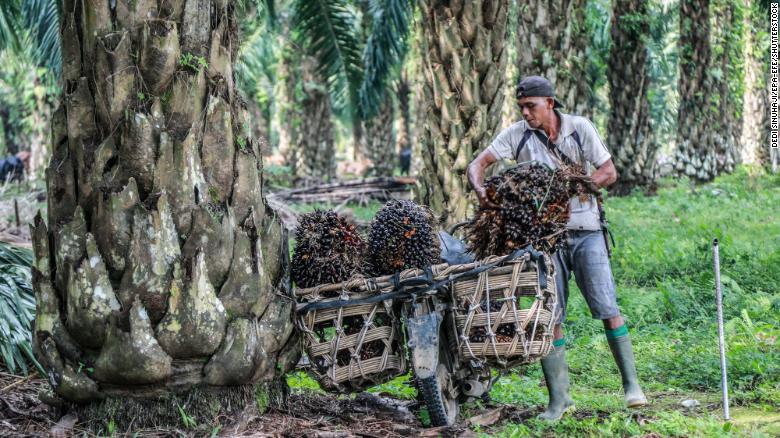IMF: War in Ukraine will make people's lives more expensive 1:35
Hong Kong (CNN Business) --
Indonesia will begin restricting palm oil exports this week, a move that could further worsen the global food crisis and boost prices for hundreds of consumer products.
President Joko Widodo announced Friday that Indonesia will suspend exports of cooking oil, and the raw materials used to make it, "until further notice" in a bid to secure local supply.
The ban will go into effect on Thursday.
The Southeast Asian country is the world's largest producer of palm oil, and Friday's announcement sent prices for the commodity "crazy," said James Fry, president of consultancy LMC International.
Crude palm oil futures in Malaysia, a global benchmark, soared nearly 7%.
The shock and prices eased somewhat this week after Reuters and Bloomberg reported that the government would exempt crude palm oil from restrictions.
Indonesia's Ministry of Agriculture did not immediately respond to a CNN Business request for comment.
But the restrictions are expected to include palm olein, a more processed product used for cooking oil that accounts for 40% to 50% of Indonesia's exports, according to analysts.
This would increase inflation, just as world food prices hit record highs.
From Pakistan to Peru, skyrocketing food and fuel prices are pushing countries to the brink
What is palm oil?
Palm oil is a common ingredient found in many foods, cosmetics, and household items around the world.
The World Wildlife Fund estimates that it is used in almost 50% of the packaged products in supermarkets.
advertising
The product is also used for cooking in many countries, including India, the world's leading importer.
Fry said the price of many pantry items, including cooking oil, instant noodles, snack foods, baked goods and margarine, could rise when Indonesian restrictions take effect.
Palm oil prices were already under pressure following the Russian invasion of Ukraine, as markets scrambled to find alternatives to sunflower oil shipments stuck at Black Sea ports.
Ukraine is usually a major producer of sunflower oil, but "Russia has completely screwed it up," Fry said.
"We have the perfect storm," he added, noting that other factors, such as droughts in South America and Canada, have also limited supplies of soybean and canola oil, respectively.
Why will Indonesia take such a step?
Indonesia's leader, also known as "Jokowi," said in a statement Friday that the decision to ban exports was to "ensure domestic availability of cooking oil" and help keep it affordable.
Indonesians have struggled to access this kitchen staple due to rising palm oil prices around the world, prompting the government to institute cash subsidies, according to Antara, the state news agency. from Indonesia.
The country had already taken other measures to protect local supply.
In January, it introduced a policy requiring exporters of palm oil products to sell 20% of their total exports into the country, according to the Department of Agriculture.
The retail price of cooking oil was also later "capped" at 14,000 Indonesian rupiah ($0.90) per liter, the agency wrote in a February update.
But the problem persists, prompting the government to take the drastic step of blocking exports last week.
Analysts say authorities want to make sure there is a sufficient supply of cooking oil ahead of the Muslim holiday of Eid, which marks the end of Ramadan and falls next week.
Indonesia is home to the largest Muslim population in the world.
A worker loads freshly harvested palm fruits onto his motorcycle at a palm oil plantation in Deliserdang, North Sumatra, Indonesia, March 15, 2022.
Who are the biggest producers?
Indonesia is by far the world's leading producer of palm oil, accounting for 59% of global production last year, according to the Department of Agriculture.
Malaysia and Thailand follow with 25% and 4% of world production, respectively.
Colombia, Nigeria and Guatemala are also key producers.
Some analysts say Malaysia could help make up the shortfall, but it faces supply problems of its own.
Sathia Varqa, co-founder of Palm Oil Analytics, an independent market data publisher, said Malaysia has suffered from labor shortages since the pandemic.
"Inventories are also historically low" in Malaysia, JPMorgan analysts wrote in a note on Friday.
Other countries are also in trouble.
India, which relies heavily on imports of vegetable oils, has already begun to feel the impact of the recent shortage, according to BV Mehta, executive director of the Solvent Extractors Association of India.
Mehta told CNN Business that people were turning to other ingredients, such as canola and peanut oil, in response to rising prices for sunflower and palm oils.
Mehta is pressing the Indian government to increase its own production of these products due to the food security "crisis".
"High prices have already taught us in the last two years to increase our own products and productivity, and with the Ukraine issue and now Indonesia... it has taught us a good lesson," he added.
Why does it come at the worst time?
The Indonesian ban comes at a bad time for global consumers.
World food prices hit their highest levels in history in March, the Food and Agriculture Organization of the United Nations (FAO) reported earlier this month.
According to their report, "the war in the Black Sea region spread disruptions in the markets for staple grains and vegetable oils."
The latest FAO food price index, which measures the monthly variation in international prices of a basic basket of food products, was 33.6% higher than in March 2021.
In their report on Friday, JPMorgan analysts said Indonesia's export ban was "adding fuel to the fire".
"This is yet another reminder of the vulnerability present throughout agricultural supply chains in an environment of already historically tight inventories, compounded by the indefinite loss of export volumes from Ukraine and historically high production costs," they wrote.
In a way, the world was depending on Indonesian palm oil "to fill the gap" left by other disruptions, "and Indonesia suddenly blocked that flow," Fry said.
-- Anna Cooban, Claudia Dominguez, Livvy Doherty, Chris Liakos, Julia Horowitz and Jorge Engels contributed reporting.
Palm oilIncrease in prices






/cloudfront-eu-central-1.images.arcpublishing.com/prisa/JIXXGYDWSWBVP3Y7SN7TECOSGE.jpg)
